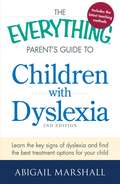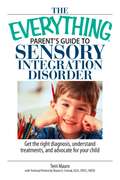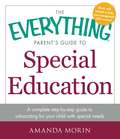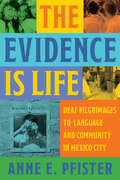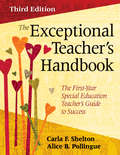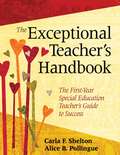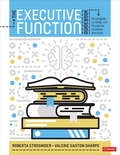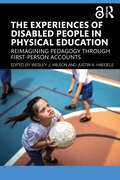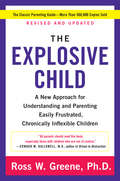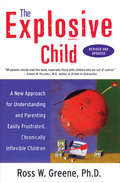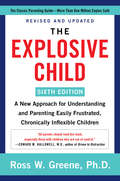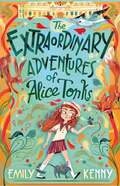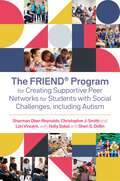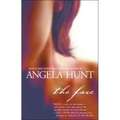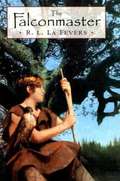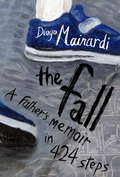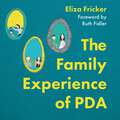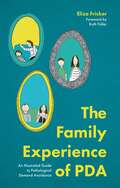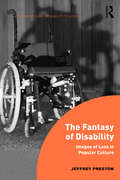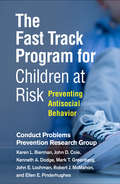- Table View
- List View
The Everything® Parent's Guide To Children With Dyslexia
by Abigail MarshallThe Everything Parent's Guide to Children with Dyslexia gives you a complete understanding of what dyslexia is, how to identify the signs, and what you can do to help your child.
The Everything® Parent's Guide To Sensory Integration Disorder
by Terri MauroThis reassuring handbook examines various forms of treatment and therapy, and provides professional advice for helping children with SID succeed in school, at home, and with friends.
The Everything® Parent's Guide to Special Education: A complete step-by-step guide to advocating for your child with special needs
by Amanda MorinBe your child's best advocate! Children with special needs who succeed in school have one thing in common--their parents are passionate and effective advocates. It's not an easy job, but with The Everything Parent's Guide to Special Education, you will learn how to evaluate, prepare, organize, and get quality services, no matter what your child's disability. This valuable handbook gives you the tools you need to navigate the complex world of special education and services, with information on: Assessment and evaluation Educational needs for different disabilities, including multiple disabilities Current law, including the Individuals with Disabilities Education Act (IDEA) Working within the school system to create an IEP The importance of keeping detailed records Dealing with parent-school conflict With worksheets, forms, and sample documents and letters, you can be assured that you'll have all you need to help your child thrive--in school and in life!
The Evidence Is Life: Deaf Pilgrimages to Language and Community in Mexico City
by Anne E. PfisterDrawing on theories of language socialization and communities of practice in an ethnographic study of deaf children and their families in Mexico City, sociolinguistic and medical anthropologist Anne E. Pfister shows how her participants reject stigmatizing social and biomedical beliefs about deafness. Grounded in over ten years of ethnographic research through participant observation, visual methods, and participatory analysis, The Evidence Is Life shares the story of La Familia López, a composite narrative woven from the common themes and experiences of the deaf individuals and families in Pfister’s study. The story of the Lopez family is framed as a pilgrimage, through which readers reflect on participating families’ journeys from confusion to profound transformation. Moving from a deficit perspective on deafness to discovering the value of accessible language, the families and children in this study eventually arrive at a community of belonging. Contextualized through Mexican history and institutional structures, The Evidence Is Life illuminates common experiences, challenges dominant narratives regarding deafness, and provides recommendations for families, educators, policymakers, medical professionals, and advocates working in deaf education.
The Exceptional Teacher's Handbook: The First-Year Special Education Teacher's Guide to Success
by Alice B. Pollingue Dr Carla F. SheltonSpecific guidelines and strategies to help special educators navigate their first year! This revised edition of a bestseller helps special educators move confidently from preplanning to post-planning for the school year. Teachers will find a step-by-step management approach complete with planning checklists and other ready-to-use forms. Featuring revisions based on IDEA 2004 and NCLB, this popular reference also provides updates on: Recognized disabilities Best instructional practices Successful parent conferences Effective plans for professional learning Alternate assessments, emergencies in the school setting, education terminology, and more
The Exceptional Teacher's Handbook: The First-Year Special Education Teacher?s Guide to Success
by Alice B. Pollingue Carla F. SheltonThe first year in the career of a special education teacher is filled with expectation and promise. Addressing the most common needs of beginning special education teachers, The Exceptional Teacher's Handbook helps new educators move confidently from preplanning to post-planning for the entire school year.The authors present a step-by-step management approach complete with planning checklists and other ready-to-use forms within the context of IDEA 2004 and NCLB. Written from the perspective of a classroom teacher, this popular reference offers updates on:* Recognized disabilities* Best instructional practices for getting the most out of your students* Successful parent conferences* Effective plans for professional learning* Alternate assessments, emergencies in the school setting, education terminology, and moreActively address challenges and concerns with this one-stop handbook that will help smooth the transition from student teacher to professional educator.
The Executive Function Guidebook: Strategies to Help All Students Achieve Success
by Roberta I. Strosnider Valerie Saxton SharpeTeach some of the most important skills your students will ever need! Executive function skills—including self-regulation, focus, planning, and time-management—are essential to student success, but they must be taught and practiced. This unique guidebook provides a flexible seven-step model, incorporating UDL principles and the use of metacognition, for making executive-function training part of your classroom routine at any grade level. Features include: Descriptions of each skill and its impact on learning Examples of instructional steps to assist students as they set goals and work to achieve success. Strategies coded by competency and age/grade level Authentic snapshots and “think about” sections Templates for personalized goal-setting, data collection, and success plans Accompanying strategy cards
The Executive Function Guidebook: Strategies to Help All Students Achieve Success
by Roberta I. Strosnider Valerie Saxton SharpeTeach some of the most important skills your students will ever need! Executive function skills—including self-regulation, focus, planning, and time-management—are essential to student success, but they must be taught and practiced. This unique guidebook provides a flexible seven-step model, incorporating UDL principles and the use of metacognition, for making executive-function training part of your classroom routine at any grade level. Features include: Descriptions of each skill and its impact on learning Examples of instructional steps to assist students as they set goals and work to achieve success. Strategies coded by competency and age/grade level Authentic snapshots and “think about” sections Templates for personalized goal-setting, data collection, and success plans Accompanying strategy cards
The Experiences of Disabled People in Physical Education: Reimagining Pedagogy through First-Person Accounts
by Justin A. Haegele Wesley J. WilsonBringing together a set of first-person accounts of physical education from the perspectives of disabled children and adults, this book puts disabled people’s voices in the foreground.The book provides a rich set of case study material that deepens our understanding of the experiences of disabled people and challenges students, researchers, and practitioners to reflect critically upon their own positionality. The first part of the book discusses the ways in which disability has been conceptualized, how the voices of disabled people have sometimes been marginalized, and how nondisability power has historically framed the narratives of disabled people in physical education literature. It also discusses the innovative methods used in this book—such as storytelling through recorded conversations and drawings in addition to more traditional chapter writing—to empower disabled children and adults to act as authors of their own stories. Then the book presents the stories themselves in a variety of written, narrative, and alternative formats, a series of authentic accounts of the lived experiences of disabled people in physical education. Finally, the book concludes with the editors’ final thoughts and reflections about this collection of stories that can be used in the classroom to foster dialogue and encourage critical thinking. Importantly, these prompts have been co-constructed between the editors and the disabled people themselves.This book is essential reading for any course in adapted physical education, physical education, or disability, for any pre- or in-service teacher, instructor, or coach working with disabled people, and for people who experience disability or their families with an interest in education, physical activity, or methods for elevating the voices of disabled people.
The Explosive Child
by Ross W. GreeneScreaming, swearing, crying, hitting, kicking, spitting, biting...these are some of the challenging behaviors we see in kids who are having difficulty meeting our expectations. These behaviors often leave parents feeling frustrated, angry, overwhelmed, and desperate for answers. In this fully revised and updated book, Dr. Ross Greene helps you understand why and when your child does these things and how to respond in ways that are nonpunitive, nonadversarial, humane, and effective.Dr. Greene describes how best to: Understand the factors that contribute to challenging episodes. Identify the specific situations in which challenging episodes are likely to occur. Reduce or eliminate challenging episodes by solving the problems that cause them. Solve problems collaboratively (rather than unilaterally) and proactively (rather than reactively). Help your child develop the skills to be more flexible, solve problems, and handle frustration more adaptively. Reduce hostility and antagonism between you and your child.With Dr. Greene's practical, expert guidance, you and your child will forge a new relationship based on communication and mutual respect.
The Explosive Child
by Ross W. GreeneWhat's an explosive child? A child who responds to routine problems with extreme frustration-crying, screaming, swearing, kicking, hitting, biting, spitting, destroying property, and worse. A child whose frequent, severe outbursts leave his or her parents feeling frustrated, scared, worried, and desperate for help. Most of these parents have tried everything-reasoning, explaining, punishing, sticker charts, therapy, medication-but to no avail. They can't figure out why their child acts the way he or she does; they wonder why the strategies that work for other kids don't work for theirs; and they don't know what to do instead. Dr. Ross Greene, a distinguished clinician and pioneer in the treatment of kids with social, emotional, and behavioral challenges, has worked with thousands of explosive children, and he has good news: these kids aren't attention-seeking, manipulative, or unmotivated, and their parents aren't passive, permissive pushovers. Rather, explosive kids are lacking some crucial skills in the domains of flexibility/adaptability, frustration tolerance, and problem solving, and they require a different approach to parenting. Throughout this compassionate, insightful, and practical book, Dr. Greene provides a new conceptual framework for understanding their difficulties, based on research in the neurosciences. He explains why traditional parenting and treatment often don't work with these children, and he describes what to do instead. Instead of relying on rewarding and punishing, Dr. Greene's Collaborative Problem Solving model promotes working with explosive children to solve the problems that precipitate explosive episodes, and teaching these kids the skills they lack.
The Explosive Child [Sixth Edition]: A New Approach for Understanding and Parenting Easily Frustrated, Chronically Inflexible Children
by Ross W Greene PhDNow in a revised and updated 6th edition, the groundbreaking, research-based approach to understanding and parenting children who frequently exhibit severe fits of temper and other challenging behaviors, from a distinguished clinician and pioneer in the field.What’s an explosive child? A child who responds to routine problems with extreme frustration—crying, screaming, swearing, kicking, hitting, biting, spitting, destroying property, and worse. A child whose frequent, severe outbursts leave his or her parents feeling frustrated, scared, worried, and desperate for help. Most of these parents have tried everything-reasoning, explaining, punishing, sticker charts, therapy, medication—but to no avail. They can’t figure out why their child acts the way he or she does; they wonder why the strategies that work for other kids don’t work for theirs; and they don’t know what to do instead.Dr. Ross Greene, a distinguished clinician and pioneer in the treatment of kids with social, emotional, and behavioral challenges, has worked with thousands of explosive children, and he has good news: these kids aren’t attention-seeking, manipulative, or unmotivated, and their parents aren’t passive, permissive pushovers. Rather, explosive kids are lacking some crucial skills in the domains of flexibility/adaptability, frustration tolerance, and problem solving, and they require a different approach to parenting. Throughout this compassionate, insightful, and practical book, Dr. Greene provides a new conceptual framework for understanding their difficulties, based on research in the neurosciences. He explains why traditional parenting and treatment often don’t work with these children, and he describes what to do instead. Instead of relying on rewarding and punishing, Dr. Greene’s Collaborative Problem Solving model promotes working with explosive children to solve the problems that precipitate explosive episodes, and teaching these kids the skills they lack.
The Explosive Child: A New Approach for Understanding and Parenting Easily Frustrated, "Chronically Inflexible" Children
by Ross W. GreeneWhat's an explosive child? A child who responds to routine problems with extreme frustration-crying, screaming, swearing, kicking, hitting, biting, spitting, destroying property, and worse. A child whose frequent, severe outbursts leave his or her parents feeling frustrated, scared, worried, and desperate for help. Most of these parents have tried everything--reasoning, explaining, punishing, sticker charts, therapy, medication-- but to no avail. They can't figure out why their child acts the way he or she does; they wonder why the strategies that work for other kids don't work for theirs; and they don't know what to do instead. Dr. Ross Greene, a distinguished clinician and pioneer in the treatment of kids with social, emotional, and behavioral challenges, has worked with thousands of explosive children, and he has good news: these kids aren't attention-seeking, manipulative, or unmotivated, and their parents aren't passive, permissive pushovers. Rather, explosive kids are lacking some crucial skills in the domains of flexibility/adaptability, frustration tolerance, and problem solving, and they require a different approach to parenting. Throughout this compassionate, insightful, and practical book, Dr. Greene provides a new conceptual framework for understanding their difficulties, based on research in the neurosciences. He explains why traditional parenting and treatment often don't work with these children, and he describes what to do instead. Instead of relying on rewarding and punishing, Dr. Greene's Collaborative Problem Solving model promotes working with explosive children to solve the problems that precipitate explosive episodes, and teaching these kids the skills they lack.
The Extraordinary Adventures of Alice Tonks: Longlisted for the Adrien Prize, 2022 (The Extraordinary Adventures of Alice Tonks #1)
by Emily Kenny&“Has heart, soul and so much spirit.&” Lindsay Galvin, author of Darwin&’s Dragons &“Disappearing animals, twists and turns, and an amazing autistic protagonist.&” Rashmi Sirdeshpande, author of Dosh &“Exciting, deftly plotted and full of surprises.&” Sinéad O'Hart, author of The Eye of the North Alice Tonks would love to make friends at boarding school. And, being autistic, she just wants people to accept her for who she is. But after a rather strange encounter with a talking seagull on her first day, she suddenly has a new challenge and a lot of questions. Animals are going missing and Alice can&’t solve the mystery alone. With new friends behind her, can Alice harness her magic powers and become the hero she never imagined? A story about finding your voice, friendship and unlikely heroes, for fans of A Kind of Spark
The Eyes That Lead: The Story of Guide Dogs for the Blind
by Michael Tucker"For anyone who has ever seen a guide dog working, or is in the slightest bit interested in dogs, I recommend they read this book and share in some of the delights of a guide dog-trainer and maybe glean a little of the love and understanding that's shared between blind person and guide dog. " From the foreword by Sheila Hocken, author of the bestselling Emma books. Michael Tucker, the highly successful guide-dog trainer who now runs his own school, here distills twenty years of practical experience to produce a fascinating and wide-ranging account of how both dog and owner are taught their roles. The book describes the choice of dog and the history of the breeds, and follows the arduous traffic training, obstacle tests and temperamental assessments to which each animal is subjected. The author explains the guidance given to the owner in gaining confidence in his or her new companion, from the initial meeting to the difficult road manoeuvres which must all be mastered. This unique and heartwarming study will serve to shatter the myths of the uncanny intelligence of the dogs, and for the first time will explain for the general public and for those more intimately concerned, the full story lying behind every blind person and his guide.
The FRIEND® Program for Creating Supportive Peer Networks for Students with Social Challenges, including Autism
by Christopher J. Smith Holly Sokol Sheri S. Dollin Sharman Ober-Reynolds Lori VincentFRIEND is a social, communication and play-based program to help school-aged children with social challenges. All students deserve a positive school experience where they can reach their social and academic potential. However, this can prove difficult for students with challenges such as attention deficit, anxiety, or autism spectrum disorders, who may struggle daily with social situations. This manual provides everything educators need to support these students with their social skills in everyday situations, throughout their school years. This program is designed to help any student with social challenges, no matter how subtle. For students without social challenges, it teaches tolerance, acceptance and understanding. The characteristics of successful social skills programs are described, with an emphasis on how FRIEND implements them through three key components: the Peer Sensitivity Curriculum, the FRIEND Lunch Program and the FRIEND Playground Program. These can be implemented individually or in any combination as a comprehensive program. Parents and family are offered information on working together with schools and implementing FRIEND strategies at home and in the community. Emphasizing peer sensitivity, education and a supportive environment, FRIEND is for any educator wanting to create an inclusive and safe atmosphere for students to learn social skill-building strategies.
The Face
by Angela Elwell HuntOrphaned and severely deformed, from her earliest moments Sarah Sims has been kept hidden away in a secret CIA facility until an unexpected discovery gives her an opportunity to make a life for herself at last. Now Sarah has an ally, a long-lost aunt who has discovered her true identity. Aided by this brave psychologist, twenty-year-old Sarah must find the courage to confront the forces that have confined her for so long. And the strength to be reborn into a world she has never known.
The Face of the Deep
by Jacob TwerskyThough it was published in 1953, this book is grimly relevant today. The author, who was blind himself, writes about blindness from the inside. The theme of the novel is prejudice with all its overwhelming repercussions. Twersky's blind characters all suffer its devastating effects, and it shapes every aspect of their lives. The self-hatred spawned by this prejudice spurs them to deny and denigrate one another. This is not a pretty story, though it has soaring moments, and some of the characters manage to rise above their circumstances with integrity and compassion intact.
The Falconmaster
by R. L. LaFeversThis fantasy combines wizardry and magic with an absorbing animal-rescue story and should appeal to all fantasy lovers, but especially boys. Wat, a crippled boy, is an outcast in his village and retreats often to the forest, away from the cruel taunts of the villagers. There he witnesses the lord's handlers heartlessly kill a nesting pair of falcons so they can take the baby birds for their master. Wat, outraged, steals the nestlings and escapes into the heart of the forest, where he meets a mysterious old man. He is a mage-a wizard-who teaches him many things, among them how to care for the birds so that they may eventually fly free, and how to find some helpful magic-which is closer to him than he ever believed.
The Fall
by Margaret Jull Costa Diogo MainardiTHE FALL is a memoir like no other. Its 424 short passages match the number of steps taken by Diogo Mainardi's son Tito as he walks, with great difficulty, alongside his father through the streets of Venice, the city where a medical mishap during Tito's birth left him with Cerebral Palsy. As they make their way toward the hospital where both their lives changed forever, Mainairdi begins to draw on his knowledge of art and history, seeking to better explain a tragedy that was entirely avoidable. From Marcel Proust to Neil Young, to Sigmund Freud to Humpty Dumpty, to Renaissance Venice and Auschwitz, he charts the trajectory of the Western world, with Tito at its center, showing how his fate has been shaped by the past. Told with disarming simplicity; by turns angry, joyful, and always generous, wise and suprising, THE FALL is an anstonishing book.
The Family Experience of PDA: A Guide to Pathological Demand Avoidance
by Eliza FrickerEliza Fricker gets it. Describing her perfectly imperfect experience of raising a PDA child, with societal judgements and family pressures, she knows how easy it is to feel overwhelmed, resentful and alone. The Family Experience of PDA's comedic illustrations explain these challenging situations and emotions in a way that words simply cannot, bringing some much-needed levity back into PDA parenting. Humorous anecdotes with a compassionate tone remind parents that they are not alone, and they're doing a great job. If children are safe, happy, and you leave the house on time, who cares about some smelly socks? A light-hearted and digestible guide to being a PDA parent covering everything from tolerance levels, relationships and meltdowns to collaboration, flexibility, and self care to dip in and out as your schedule allows to help get to grips with this complex condition. This book is an essential read for any parent with a PDA child, to help better understand your child, build support systems and carve out some essential self-care time guilt-free.
The Family Experience of PDA: An Illustrated Guide to Pathological Demand Avoidance
by Eliza FrickerEliza Fricker gets it. Describing her perfectly imperfect experience of raising a PDA child, with societal judgements and internal pressures, it is easy to feel overwhelmed, resentful and alone. This book's comedic illustrations explain these challenging situations and feelings in a way that words simply cannot, will bring some much-needed levity back into PDA parenting. Humorous anecdotes with a compassionate tone remind parents that they are not alone, and they're doing a great job. If children are safe, happy, and you leave the house on time, who cares about some smelly socks? A light-hearted and digestible guide to being a PDA parent covering everything from tolerance levels, relationships and meltdowns to collaboration, flexibility, and self care to dip in and out as your schedule allows to help get to grips with this complex condition. This book is an essential read for any parent with a PDA child, to help better understand your child, build support systems and carve out some essential self care time guilt free.
The Fantasy of Disability: Images of Loss in Popular Culture (Interdisciplinary Disability Studies)
by Jeffrey PrestonWhat are the unconscious fantasies circulating in representations of disability? What role do these fantasies play in defining the condition of disability? What can these fantasies teach us about human vulnerability writ large? The Fantasy of Disability explores how popular culture texts, such as Degrassi: The Next Generation and Glee, fantasize about what life with a physical disability must be like, while at the same time exerting tremendous pressure on disabled individuals to conform their identity and behaviour to fit within the margins of these societally perpetuated archetypes. Rather than merely engaging with how disability is represented, though, this text investigates how representations of disability reveal their nondisabled producers to be perpetually anxious subjects, doomed to fear not just the disabled subject but the very reality of disability lurking within. Situated at the nexus of disability studies, media studies and psychology, this text presents an innovative way of analyzing representations of disability in popular culture, inverting the psychoanalytic gaze back upon the nondisabled to investigate how disability can become a lens through which to interrogate the normate subject.
The Fast Track Program for Children at Risk: Preventing Antisocial Behavior
by Karen L. Bierman John E. Lochman Mark T. Greenberg Conduct Problems Prevention Research Group John D. Coie Kenneth A. Dodge Robert J. McMahon Ellen E. PinderhughesThis unique volume reports on the largest long-term preventive intervention study ever conducted with children at risk for serious violence and poor life outcomes. From first through 10th grade, Fast Track provided multicomponent interventions to support children, families, and schools in achieving positive social, emotional, and academic outcomes. The book explores the developmental processes associated with early aggression, describes how each component of FastTrack was developed and implemented, and summarizes outcomes up to 20 years later. Vivid case studies track the impact of comprehensive school- and family-based programming on children's pathways through the elementary and high school years. The concluding chapter offers recommendations for using Fast Track components in future violence prevention initiatives. See also the authors' Social and Emotional Skills Training for Children: The Fast Track Friendship Group Manual, a step-by-step guide to implementing one of the core components of Fast Track.
The Fastest Girl on Earth!: Meet Kitty O'Neil, Daredevil Driver!
by Dean RobbinsGear up for this high-powered picture book biography about Kitty O'Neil, the stuntwoman and racecar driver who broke the women's land speed record!Kitty O'Neil was a force to be reckoned with. She became deaf as a child, and grew up loving sports and action. Kitty jumped, ran, raced, and swam, all while learning to read lips and communicating through sign language. Eventually, Kitty took a job as a stuntwoman, doing the most dangerous job on set and even filming stunts for films like Wonder Woman! Still, Kitty wanted more thrills. She became a racecar driver and sought to do what no woman had done before. She chose the aptly named Motivator and trained like a true champion. In 1976, Kitty and the Motivator broke the land speed record, racing at over 600 miles per hour! Kitty was a hero to fans everywhere, and proved that she was truly unstoppable.
